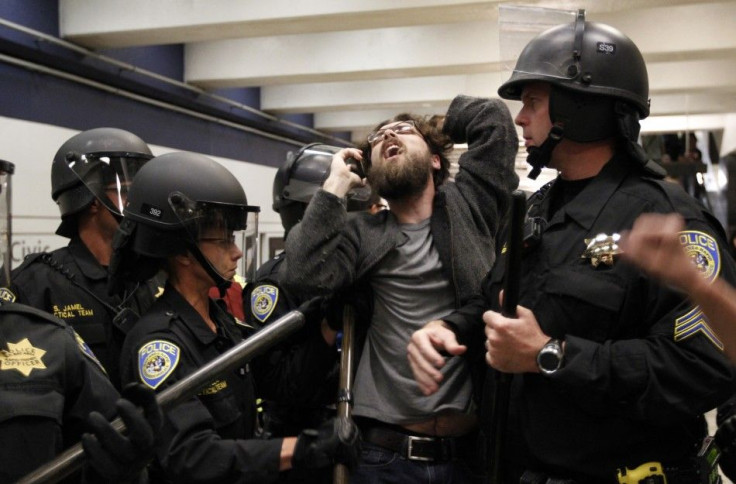San Francisco Mass Transit Closes Four Stations Following Hacking Protest by Anonymous

In what might be an unprecedented event in the history of U.S. mass transit, computer hackers from a group known as Anonymous forced the city of San Francisco to shut down four of its commuter railway stations Monday night.
Anonymous hacked the computer system of the Bay Area Rapid Transit System (BART) to protest the agency’s decision to temporarily shut down underground cell phone service last week.
The four stations that were closed -- Civic Center, Powell, Montgomery and Embarcadero – are busy commuter hubs in the downtown section of the city. Police officers in riot gear blocked the entrances, causing chaos and anger among thousands of would-be passengers.
Closed at 5 p.m., the stations were re-opened at 7:30 p.m. – the heart of the rush hour. In concert with the BART stations, Muni Metro stations were also closed during this period.
During the shutdown, trains rolled through the stations, but only let passengers exit. Outside on the streets, protesters decried the closings, with many reportedly endorsed by Anonymous itself.
However, no arrests or disturbances were reported.
BART's Deputy Police Chief Daniel Hartwig told local media: "Once we got to a situation where the BART platform was unsafe, we cleared the station.
Hartwig added: "The bottom line with cell service is that it's always in the game plan, but we chose not to utilize that resource tonight. Once we read the dispersal notice and they complied, we didn't feel like any other actions were required."
One commuter was outraged by the disruptions. She told a local; newspaper: "This is an outrage. We just want to get home. I don't really see why they should be shutting down the stations. If they have an issue with BART, they should go to BART headquarters."
Following the re-opening of the stations, BART spokesman Linton Johnson told reporters: "Tonight our customers are angry and frustrated."
The incident that sparked the protest last Thursday – the prohibition of underground mobile phone service – was designed by authorities to thwart a demonstration against the police. (In early July, a BART police officer killed a knife-wielding man).
The BART spokesman, Johnson, said earlier that the agency has the right to cut cell phone service and that riders "don't have the right to free speech inside the fare gates."
"We're in the business of transporting people from point A to point B safely," he said. "We were forced into a gut-wrenching decision on how we were going to stop (the possible Thursday protest), given the propensity of this group to create chaos on the platform."
However, The Federal Communications Commission (FCC) is probing BART's action.
FCC spokesman Neil Grace said in a statement: "Any time communications services are interrupted, we seek to assess the situation."
The FBI is also investigating allegations that Anonymous hacked BART’s computers.
© Copyright IBTimes 2025. All rights reserved.





















